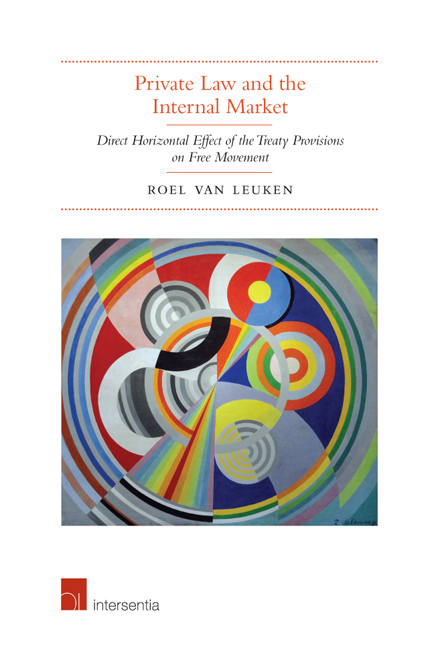 Private Law and the Internal Market
Private Law and the Internal Market Book contents
- Frontmatter
- Preface
- Contents
- Table of Cases
- List of Abbreviations
- Chapter 1 Introduction
- Part I Direct Horizontal Effect: Concept and Application in Competition Law
- Part II Direct Horizontal Effect: Internal Market
- Part III Justifications
- Chapter 8 The System of Written and Unwritten Justifications
- Chapter 9 Justifications in Private Law Relationships
- Chapter 10 Summary and Conclusions
- Bibliography
- Index
Chapter 8 - The System of Written and Unwritten Justifications
from Part III - Justifications
Published online by Cambridge University Press: 27 September 2018
- Frontmatter
- Preface
- Contents
- Table of Cases
- List of Abbreviations
- Chapter 1 Introduction
- Part I Direct Horizontal Effect: Concept and Application in Competition Law
- Part II Direct Horizontal Effect: Internal Market
- Part III Justifications
- Chapter 8 The System of Written and Unwritten Justifications
- Chapter 9 Justifications in Private Law Relationships
- Chapter 10 Summary and Conclusions
- Bibliography
- Index
Summary
INTRODUCTION
This chapter contains an overview of the current system of written and unwritten justifications. It successively addresses the Treaty exceptions (section 8.2.), the rule of reason exceptions (section 8.3.) and the justification on grounds of protecting fundamental rights (section 8.4.). In addition, it briefly considers the important role played by the principle of proportionality in the substantive assessment of a party's reliance on one of these exceptions (section 8.5.). The chapter ends with a brief conclusion (section 8.6.).
TREATY EXCEPTIONS
The free moment provisions do not amount to absolute prohibitions; the Treaty provides for exceptions. Article 36 TFEU, for instance, states that the rules on free movement of goods (Articles 34 and 35 TFEU)
shall not preclude prohibitions or restrictions on imports, exports or goods in transit justified on grounds of public morality, public policy or public security; the protection of health and life of humans, animals or plants; the protection of national treasures possessing artistic, historic or archaeological value; or the protection of industrial and commercial property.
The list of Article 36 TFEU is exhaustive: it contains all written grounds that may justify distinctly and indistinctly applicable measures. Less extensive, but likewise exhaustive is the list of exceptions to the prohibitions of Article 45 TFEU. Under Article 45(3), discriminatory and non-discriminatory restrictions on the free movement of workers may be justified ‘on grounds of public policy, public security or public health’.
This trio returns in Article 52(1) TFEU, which provides as follows in regard to the freedom of establishment (Article 49 TFEU) and the freedom to provide and receive services (Article 56 TFEU):
The provisions of this Chapter and measures taken in pursuance thereof shall not prejudice the applicability of provisions laid down by law, regulation or administrative action providing for special treatment for foreign nationals on grounds of public policy, public security or public health.
- Type
- Chapter
- Information
- Private Law and the Internal MarketDirect Horizontal Effect of the Treaty Provisions on Free Movement, pp. 141 - 150Publisher: IntersentiaPrint publication year: 2017


